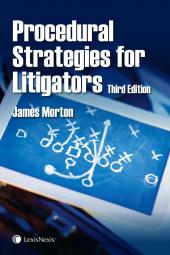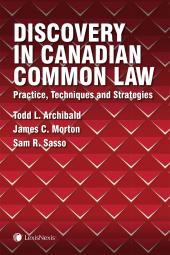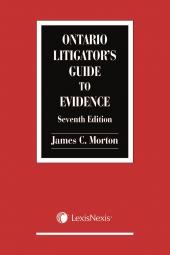Procedural Strategies for Litigators, 3rd Edition
The main objective of this book is to enable lawyers to do just that by helping them to recognize the strengths and weaknesses inherent in the civil procedure of Ontario, and to understand how to best leverage them for the benefit of their clients.
One Year Subscription Only Terms
Subscribers receive the product(s) listed on the Order Form and any Updates made available during the annual subscription period. Shipping and handling fees are not included in the annual price.
Subscribers are advised of the number of Updates that were made to the particular publication the prior year. The number of Updates may vary due to developments in the law and other publishing issues, but subscribers may use this as a rough estimate of future shipments. Subscribers may call Customer Support at 800-833-9844 for additional information.
Subscribers may cancel this subscription by: calling Customer Support at 800-833-9844; emailing customer.support@lexisnexis.com; or returning the invoice marked 'CANCEL'.
If subscribers cancel within 30 days after the product is ordered or received and return the product at their expense, then they will receive a full credit of the price for the annual subscription.
If subscribers cancel between 31 and 60 days after the invoice date and return the product at their expense, then they will receive a 5/6th credit of the price for the annual subscription. No credit will be given for cancellations more than 60 days after the invoice date. To receive any credit, subscriber must return all product(s) shipped during the year at their expense within the applicable cancellation period listed above.
Détails des produits
As veteran litigator and author James C. Morton points out in the Introduction to the latest edition of Procedural Strategies for Litigators, "In the adversary system, the lawyer's duty … is to fearlessly raise every issue, advance every argument and ask every question that will help a client obtain the benefit of every remedy or defence authorized by law." The main objective of this book is to enable lawyers to do just that by helping them to recognize the strengths and weaknesses inherent in the civil procedure of Ontario, and to understand how to best leverage them for the benefit of their clients.
An up-to-date reference
By highlighting all of the significant changes in procedural law since the book was last published in 2007, Procedural Strategies for Litigators, 3rd Edition offers a current look at the tricks, traps and tactics lawyers use to advance or delay their clients' positions. In particular, this volume includes strategies used in specialized areas of the law and provides insight into procedural tips under the Simplified Rules, in Case Management and in estates, banking and bankruptcy litigation.
Organized into short, concise chapters to help lawyers save time and simplify their research, the latest edition of this book discusses the most recent changes to the rules of civil procedure and their effect on the tactics and strategies used in litigation. Order your copy of Procedural Strategies for Litigators, 3rd Edition today and learn more about:
- How changes to the summary judgments and specific scheduling rules have altered the legal landscape and ways to speed up – or slow down – cases
- Recent amendments to evidence law and how they have affected what is and is not admissible in court
- The ways electronic communications have transformed the general thrust and parry of today's legal communications
- Tactics for dealing with bullies and other issues in real time
Required reading
Procedural Strategies for Litigators, 3rd Edition is a valuable resource that will be a useful addition to the bookshelf of:
- Civil litigation and tort lawyers who need to fully understand the impact of changes to the rules of civil procedure so they can save time, and easily spot tricks and avoid pitfalls
- Law clerks and paralegals who require a thorough knowledge of the rules of civil procedure as they evolve as well as their practical application
Table des matières
Preface
Acknowledgements
Chapter 1: Introduction
Chapter 2: Parties
Chapter 3: The Claim and Reply
Chapter 4: The Defence
Chapter 5: Counterclaims, Crossclaims, and Claims Over
Chapter 6: Interlocutory Motions (Non-Final)
Chapter 7: Interlocutory Motions Resulting in Judgement
Chapter 8: Sentencing Under the Youth Criminal Justice Act
Chapter 9: Evidence on Motions and Applications
Chapter 10: Documentary Production
Chapter 11: Examination for Discovery
Chapter 12: Preserving Rights in Pending Litigation: Interlocutory Injunctions, Mandatory Orders & Receiverships
Chapter 13: Alternative Dispute Resolution
Chapter 14: Pre-Trials
Chapter 15: Trial
Chapter 16: Appeals
Chapter 17: Argument After Hearing
Chapter 18: Simplified Procedure
Chapter 19: Class Actions in Ontario
Chapter 20: Other Particular Proceedings
Chapter 21: How to Deal with Bullies
Chapter 22: Judicial Pronouncements on Compliance with the Rules
 Lexis Nexis
Lexis Nexis 



